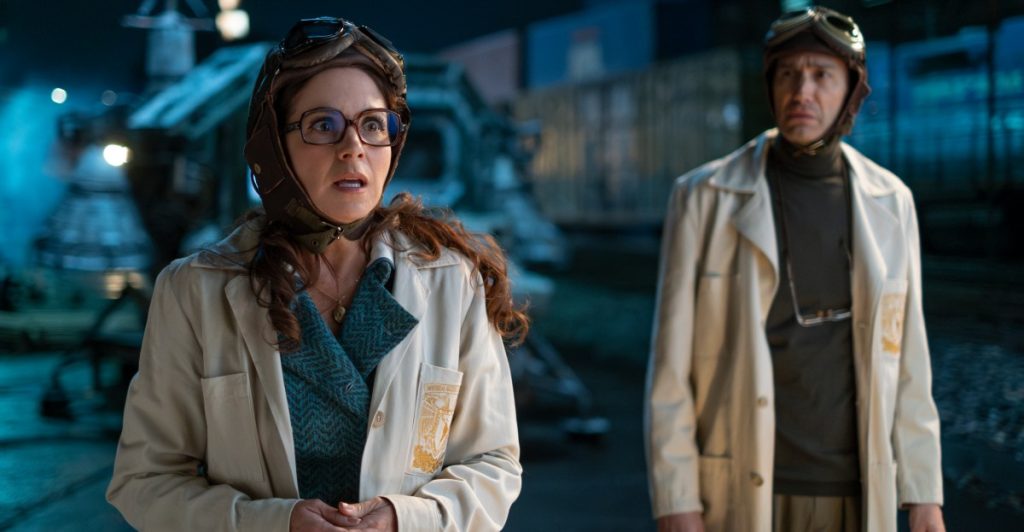In a landscape saturated with time travel tales often centered around correcting past mistakes, Netflix’s Our Times breaks from tradition by charting a course into the future, exploring how its characters navigate personal and societal growth. This fresh perspective on temporal journeys, while layered with humor and romance, also raises crucial questions about gender roles and opportunities in our modern world.
Plot Overview
Our Times centers on Nora Esquivel, played by Latin Grammy Awards host Lucero, and her husband Héctor (Benny Ibarra), both physicists in 1966 Mexico. Their ambitious goal is to construct a time machine, but Nora’s expertise is consistently overshadowed by the male-dominated environment at the National Autonomous University of Mexico. This tension is mirrored in their relationship dynamic, where Héctor, despite being supportive, fails to challenge the institutional biases that marginalize Nora’s contributions.
The story takes a pivotal turn when the couple ironically finds themselves stranded in 2025 after an unexpected mishap with their time machine. Their comedic yet enlightening struggle to adapt to modern technology is rooted in their growing awareness of evolving gender dynamics, leading to a significant shift in their relationship. As Nora grapples with her newfound confidence and the opportunities available to women in STEM, Héctor confronts insecurities stemming from their contrasting experiences in the 2020s.
Thematic Exploration of Gender Dynamics
Structured around the premise of time travel, Our Times delves into deeper societal issues, particularly the historical relegation of women’s contributions in science. The film simultaneously serves as a commentary on contemporary gender disparities, drawing parallels with real-life figures such as Rosalind Franklin and Chien-Shiung Wu, who have been historically overlooked despite their groundbreaking work.
As their journey unfolds, Nora encounters her former student Julia, now the dean of the university in 2025. This character serves as a representation of the opportunities women have begun to seize in academia, emphasizing Nora’s potential for acknowledgment and success that had eluded her in the past. The film contrasts the couple’s relationship, where Nora’s ambitions clash with Héctor’s reluctance to adapt, highlighting the evolving expectations of men and women in both personal and professional spheres.
Character Development and Relationships
The film’s core revolves around the relationship between Nora and Héctor, showcasing their chemistry as they navigate not only the comedic challenges of modern life but also the increasingly complex power dynamics within their marriage. Lucero and Ibarra effortlessly bring their characters to life, imbuing their interactions with warmth, humor, and a palpable sense of nostalgia.
However, the rapid unraveling of their relationship as they grapple with their identities raises questions about male vulnerability and the effects of societal changes. Héctor’s struggle between his past status as a celebrated scientist and his present insecurities underscores a critical commentary on traditional masculinity. Scenes such as a drunken social media outburst rooted in jealousy highlight an essential, albeit underdeveloped, narrative regarding the emotional turmoil many men experience in an evolving societal landscape that favors women’s achievements.
Interestingly, the film reflects upon the often-ignored emotional complexities faced by men in patriarchal societies. Instead of delving deeper into Hector’s psyche, the narrative opts for a more straightforward portrayal of his discomfort with shifting roles, missing out on potential layers of exploration regarding male friendship and vulnerability, themes discussed in articles like The New York Times.
Cultural Context and Reception
The release of Our Times occurs against a backdrop of increasing visibility for women in science and technology fields, with notable mentions of STEM achievements by women consistently making headlines. According to a study by Statista, the number of women pursuing STEM careers has tripled in the past decade, indicating a cultural shift that the film captures, albeit superficially.
While the story threads in humor and romance, it provides a bittersweet commentary on personal growth and the importance of embracing new connections rather than clinging to the past. Ultimately, Our Times takes a refreshing stance on the traditional time travel narrative, focusing on forward momentum and the dynamics of relationships amidst shifting societal expectations.
Conclusion
While Our Times introduces a captivating premise with its unique take on time travel, the film could have benefited from a deeper exploration of its characters’ emotional arcs and societal commentary. Nonetheless, it offers a poignant reflection on the evolving landscape of gender roles, ultimately encouraging viewers to consider their paths towards personal growth in an ever-changing world. The film is currently available for streaming on Netflix.

